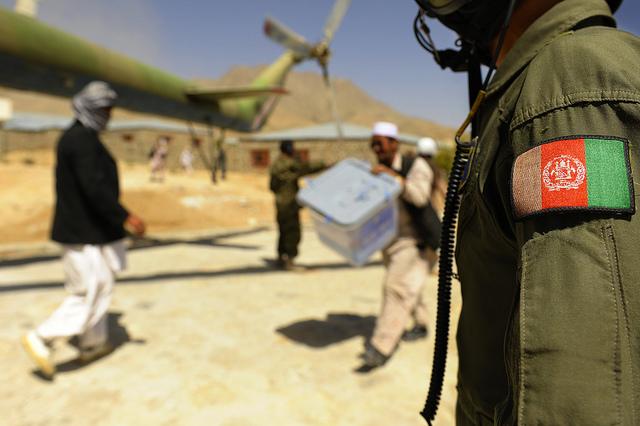There are few political processes more sensitive than national elections, particularly one that’ll be historic in its implications. Afghanistan’s recent election will mark its first peaceful, democratic transition of power. It was the first poll held under the sole responsibility of the Afghan government since the fall of the Taliban in 2001.
Understandably, Afghan efforts to date have minimised the international community’s role in the election process. While the international community supported the elections process and preparations, the elections were Afghan-led and Afghan-managed. President Karzai’s goal was for a ‘purely Afghan process’.
But much like the 2009 presidential elections, this year’s run-off election appeared marked by rampant fraud. That not only delegitimises the eventual winner, regardless of a credible audit, but risks pushing the country towards civil war.
The conduct of these elections also jeopardises long-term assistance from Afghanistan’s international partners. The international community has said repeatedly that these national elections will be instrumental in determining the future of international assistance to Afghanistan. The United Nations Assistant Secretary-General for Peacekeeping Operations, Edmond Mulet, put it bluntly in April 2013:
…if these elections were not to be credible or if there was fraud or there was manipulation that the results were not recognized as acceptable, then you would see certainly from the donor community, international community, they won’t be really interested or motivated to continue assisting Afghanistan the same way as they did before.
In short, fraud fundamentally jeopardises the stability of Afghanistan, and thus the goals that the international coalition, including Australia, has sacrificed so much for.
But there’s a silver lining, slight as it may be.
In response to the looming crisis, Afghan presidential candidates Dr Abdullah Abdullah and Ashraf Ghani Ahmadzai, along with President Hamid Karzai, have agreed to an audit of all eight million votes from the 14 June run-off election. Every ballot cast will be audited. And in a somewhat surprising turn of events, the United Nations and international community will take a leadership role in the audit.
The Afghan government, with President Karzai’s consent, has wilfully chosen to invite, and trust, the United Nations, the UN-mandated International Security Assistance Force (ISAF) and international observers to shape, assist with, and oversee the audit. It’ll be ISAF, not the Afghan National Security Forces (ANSF), who’ll be responsible for transporting ballots to Kabul, though the two forces will be providing joint security for the audit. The audits themselves will be internationally supervised, as proposed by the United Nations. Access to the ballot boxes by candidates’ agents will be allowed only under the eye of ISAF and the ANSF. The audit is a direct contrast to how Afghanistan insisted the elections be conducted.
While Afghanistan didn’t demonstrate the capacity hoped for in the elections, the international community should take comfort in this fact: the future leaders of Afghanistan will accept international assistance with their most sensitive challenges before crises escalate to a point of no return. When push comes to shove, even President Karzai, who’ll undoubtedly remain an influential figure in Afghanistan politics, can be reasonable.
That’s also a positive signal a Bilateral Security Agreement (BSA) will be signed between the US and Afghanistan, as well as between NATO and Afghanistan. Although both presidential candidates have stated previously that they support the signing of such an agreement, which would allow foreign military forces to remain in country past 2014, negotiations have the potential to look different once in power. Remember that Karzai too once stated that he intended to sign such an agreement, and then reneged on that commitment. Nothing is certain, but at least the signs are positive.
While Australia, and the international community, would prefer greater transparency and insight into Afghan processes than they will get post-2014, the important point is that Afghanistan doesn’t intend to exercise its sovereignty at all costs. Afghanistan may not be as far along as we’d like come 2015, but it’ll still be an Afghanistan that we can work with.
Brieana Marticorena is a visiting fellow at ASPI. Image courtesy of Flickr user ISAFmedia.
